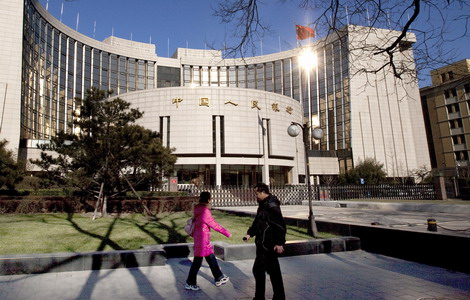Decrease in lending deepens concerns
Updated: 2012-02-11 07:56
By Wang Xiaotian (China Daily)
|
||||||||
|
 Pedestrians walk past the People's Bank of China in Beijing. The central bank statistics suggest that Chinese banks lent less than expected in January and the broad measure of money supply hit the lowest level in more than 11 years. [Photo / Bloomberg] |
BEIJING - Concerns over market liquidity and economic recession have become more acute after banks lent less than expected in January and the broad measure of money supply hit the lowest level since June 2001.
That's according to data released by the People's Bank of China, the central bank, on Friday.
Chinese lenders lent a total of 738.1 billion yuan ($117.3 billion) in the first month of 2012. "That's a lower figure than our expectations and the records over the years. Between 2009 and 2011, new yuan loans in the first month of the year were all above the level of 1 trillion yuan," said E Yongjian, an economist at Bank of Communications Co Ltd.
He said the main reason for the decline was that the authorities had strengthened controls over the pace of lending. "And the declining credit demand from enterprises, as overseas demand dropped and export orders fell, also accounted for the lower figure."
While lending shrank compared with previous years, 800 billion yuan flowed out from banks in January and money supply indicators tumbled.
M2, a broad measure of money supply that covers cash in circulation and all deposits, grew by 12.4 percent year-on-year, down by 1.2 percentage points from the end of 2011.
Meanwhile, M1, a narrow measure of money supply which covers cash in circulation plus demand deposits, increased by 3.1 percent from a year earlier, 4.8 percentage points lower than the growth rate at the end of 2011.
"These numbers are a huge disappointment," Yao Wei, China economist at the French bank Societe Generale SA, was quoted by Reuters as saying.
She said that the main reason for the fall lay in a seasonal decline in deposits and the "low lending number" caused by two factors - the central bank doesn't want banks to increase lending too much in the first month of the year, and many banks are probably constrained by the loan-to-deposit ratio, which technically means they can't provide any more loans.
Yao said the central bank is saving some bullets to shore up the economy in the future, but if it decides to ease monetary conditions more obviously, the policy should be targeted at the loan-to-deposit ratio, the real binding constraint for lenders, instead of the required reserve ratio.
E said the January figures carry signals from the regulators that the government requires banks to lend at a moderate pace and that credit supply this year will not be overly loose.
"We maintain our prediction that growth in new yuan lending throughout the year will stand at somewhere between 8 and 8.5 percent, a moderate easing compared with 2011." Banks lent a combined total of 7.5 trillion yuan last year.
E also predicted that the reserve requirement ratio will be lowered twice this year, each time by 0.5 percentage points, and interest rates would remain stable.

 Relief reaches isolated village
Relief reaches isolated village
 Rainfall poses new threats to quake-hit region
Rainfall poses new threats to quake-hit region
 Funerals begin for Boston bombing victims
Funerals begin for Boston bombing victims
 Quake takeaway from China's Air Force
Quake takeaway from China's Air Force
 Obama celebrates young inventors at science fair
Obama celebrates young inventors at science fair
 Earth Day marked around the world
Earth Day marked around the world
 Volunteer team helping students find sense of normalcy
Volunteer team helping students find sense of normalcy
 Ethnic groups quick to join rescue efforts
Ethnic groups quick to join rescue efforts
Most Viewed
Editor's Picks

|

|

|

|

|

|
Today's Top News
Health new priority for quake zone
Xi meets US top military officer
Japan's boats driven out of Diaoyu
China mulls online shopping legislation
Bird flu death toll rises to 22
Putin appoints new ambassador to China
Japanese ships blocked from Diaoyu Islands
Inspired by Guan, more Chinese pick up golf
US Weekly

|

|







